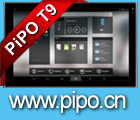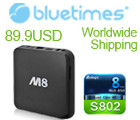The Wi Drive DX-325 is the first device that combines a router, a wireless network adapter and NAS.
$40 Media Player by Cepa
It has everything one needs and will be available from end of year 2010.
7′ Android Tablet “Tab 7”
Usmart’s Tab 7 runs Android 2.1 and is powered by an ARM 11 processor. It has a resistive screen, built in WiFi and supports 3G dongles.
Asus Eee Pad runs Windows Embedded Compact 7
Here is one very cool looking, ultra thin and ultra light tablet by Asus powered by Windows CE7 and running on an NVidia Tegra processor. It’s only 0,48 inches (1,21cm) thick, sports a touchscreen and a built in camera, supports Adobe Flash and is said to have 10hrs of battery life. Asus announced its release for end of 2010/beginning of 2011 but did not reveal the price. According to rumours it will start at $399.
Related articles by Zemanta
- Asus squirts out a Windows-powered EEE Pad (crunchgear.com)
- Asus Joins Tablet PC Race (mobile.slashdot.org)
- ASUS Eee Pad EP101TC and EP121 preview (engadget.com)
- Asus and MSI Unveil an Onslaught of Tablets (mashable.com)

Inventec Dr eye
Cool looking pocketable Android powered full computer system by Inventec.
Pixel Qi shows 10″ capacitive
Imagine being able to combine the Laptop, Tablet and e-reader into one convertible device, then having a screen technology that enables you to take it outside in the sun! Geeks outdoors in the sun, how cool is that going to be? Imagine also being able to turn off the backlight, increase up to 5x the battery runtime of your Tablet compared to for example the iPad. At Computex 2010, Pixel Qi is finally releasing the 3Qi screen, here demonstrating 10″ capacitive touch screen support and with half a dozen or more major partners. Here are some details from Mary Lou Jepsen, CTO of Pixel Qi, about the current status of the mass manufacturing of this technology. Look forward to many more Pixel Qi related videos from Computex 2010 uploaded right here on http://ARMdevices.net
QOOQ tablet culinary coach
This is the QOOQ tablet, perhaps worlds first commercially available consumer 10.1″ capacitive tablet, has been available only in France since October 2009 (many months before the iPad), it uses a glass panel which is also useful for it to resist the attacks of ingredients in the kitchen as it is water and smudge proof. This product features many interactive recipes, some of them from Frances top chefs, with step-by-step videos. The content is streamed from the QOOQ Akamai servers, over Wifi or Ethernet, with additional recipes being added over the Internet.
The QOOQ is released by the French company Unowhy, the first such customized design released on the Shogo tablet platform from Hong-Kong company Realease, and runs on a Freescale i.MX37 processor with Linux. It currently is sold only in France for 349€.
Related articles by Zemanta
- Shogo 10-inch capacitive open-source Linux Tablet (armdevices.net)
- Shogo 10-inch Linux tablet is a Qooq minus the recipes — and the feet (video) (engadget.com)

I’m testing Chromium OS on ARM Cortex A8, Freescale i.MX51
Here’s a recent build of Chromium OS running on the ARM Cortex A8 Freescale i.MX51 processor platform in a desktop form factor, using a keyboard and mouse on a DVI monitor.
Related articles by Zemanta
- Chromium OS on a $199 Tablet powered by Freescale (armdevices.net)

Ubuntu 10.4 optimized for the ARM Processor
Ubuntu has been working over these past couple of years with ARM and ARM partners such as Freescale to optimize the Ubuntu OS for ARM Processors. Here’s a demonstration of the latest version of Ubuntu 10.4 running on a Freescale i.MX51 development board. In theory this Ubuntu desktop could be sold for below $100 without the screen, keyboard and mouse.
Related articles by Zemanta
- Quake 3 on Freescale i.MX51 (armdevices.net)

Marvell makes OLPC XO-3 Tablet, now official
I predicted it in my article on 18th March, Marvell’s Moby Tablet announcement is the beginning of the new OLPC XO-3 project.
This is great news! It means XO-3 is coming earlier than 2012 as originally planned. It’ll basically start coming as soon as the next generation Marvell Armada 61X processor is ready. Check my video of Marvell Armada 610 and my video of the Marvell Armada 618 to have an idea how impressive this processor is. This means that prototypes of XO-3 could be showcased today and I’m guessing mass manufacturing can start before the end of year.
This also means the 5000+ people at Marvell are now working towards reaching the goals of the OLPC project. Cheaper access to learning, information, web, online entertainment, e-books, worldwide communications, all this is great!
Read the press release: http://www.marvell.com/company/news/press_detail.html?releaseID=1418
Related articles by Zemanta
- OLPC sees bandwagon, hops on with XO tablet based on Marvell Moby design (engadget.com)
- OLPC to use Pixel Qi 3Qi screens (armdevices.net)
- Marvell to kickstart education tablets with One Laptop Per Child (mobile.venturebeat.com)
- OLPC should have an XO-3 prototype ready by the end of the year (engadget.com)
- OLPC XO-3 Dream Tablet May Come True After All [Olpc] (gizmodo.com)

Exclusive: Shogo 10-inch capacitive open-source Linux Tablet
Realease is launching this Freescale i.MX37 (ARM11) and i.MX51 (ARM Cortex A8) based Linux open-source Tablet. With a whole range of customized features, on an open HTML5, Qt, Flash even Android-compatible development platform, customizable designs, 1 external USB, 2 internal USB (for adding internal USB 3G dongle and other), motion sensor, camera, ambient light sensor, and more.
It is meant for software developers who want a platform to develop or port their solutions for B2B usages like medical, planes, hotels, or any niche consumer markets where a closed solution is required (unlike the iPad) check for instance the QOOQ culinary coach, a tablet that is derived from the Shogo predecessor.
Qt on Freescale i.MX51 and i.MX233
You may have seen my recent video of Qt demonstrated at Mobile World Congress. Here’s a demonstration of Qt 4.6 running on two Freescale processors.
Freescale Futuremark 3D benchmark
A Freescale graphics expert shows a benchmark from Futuremark running on Freescale i.MX51, leveraging the processor’s OpenGL ES 2.0 GPU.
Freescale 3D video
This video shows how to leverage a Video processor and a Graphics processor (GPU) to show 3D videos. This is done on the Freescale i.MX51 System-on-chip, that integrates an ARM Cortex A8 processor + a video processor + 2 GPUs.
Quake 3 on Freescale i.MX51
Freescale is demonstrating Quake 3 on Android 2.1 running on their ARM Cortex A8 Freescale i.MX51 processor platform. It seems to run pretty smoothly with a decent frame rate outputted on this 800×480 medium density screen. This degree of success in 3D hardware acceleration for advanced 3D games on ARM devices with Android, as well as the achievements by the Unreal Engine group (watch my video Interview with Unreal Engine founder of Epic Games talking about Unreal Engine on Android), can give us a pretty good idea of how extremely advanced and fun 3D gaming can quickly become on these new Android devices.
Realize this, Quake 3 and even Unreal Tournament is running smoothly on our pocketable ARM Powered devices!
OpenVG hardware acceleration by Freescale
You may be familiar with OpenGL hardware acceleration in all the recent ARM Processors, but check this recent API from the Khronos group: OpenVG. It is meant at rendering Vector Graphics, where basically the images are stored not in bitmaps (a sum of pixels) but in maths formulaes. Each time you need to re-draw the image, you just have to re-calculate the vectors to show high quality pictures and animations. This is what pdf and postscripts use, and this is especially useful for zooming. All cool user interfaces should use OpenVG at some point, which is easier and more flexible than OpenGL thus for certain graphics and animations to be used in all kinds of user interfaces as well as content.
So far, most processors could support OpenVG on top of the OpenGL hardware accelerator. But Freescale added a second GPU in its i.MX processors. So for instance their i.MX51 has a GPU for OpenGL and a second GPU for OpenVG.

carrypad.com: Compaq Airlife 100 video-review
You may have seen my previous videos of the HP Compaq Airlife 100 as I filmed it at consumer electronics trade shows these past few months at CES and at Mobile World Congress.
Carrypad.com has got one from HP Spain and have posted this video review.
Related articles by Zemanta
- Compaq Airlife 100 exclusively available to Telefónica customers for 229 euros in May (engadget.com)
- HP Compaq Airlife 100 review roundup: a little too dumb for a smartbook (engadget.com)

Were there Android Tablets at GoogleI/O?
I was expecting Google to launch Android Tablet Edition at the recent Google I/O, but watching through the two keynotes videos (1, 2), I can only see lots interesting things about WebM open-source free licence VP8 video codec launch, awesome new Android 2.2 features and Google TV launch, but no mention of them bringing their Android Martketplace to tablets.
NetbookNews.com did find a Nvidia Tegra 2 based new Android tablet showcased, but no talk or confirmation on if it will come with the Google Marketplace officially pre-installed:
Related articles by Zemanta
- Google I/O recap: more web than you can shake a frozen desert at (engadget.com)
- Five Amazing App and Gadget Demos from Google I/O [VIDEO] (mashable.com)

Review: Novatel Wireless Mifi 2352 vs Huawei e5830
The Mifi is a great solution for bringing a WiFi hotspot with you everywhere in the city and even in the country (depending on HSDPA/UMTS/GPRS coverage in your country). It’s perfect to add 3G connectivity to your Archos, iPad, iPod Touch, Laptops and any other WiFi-only devices that you may have. In this video, I compare the performance and features of the two Mifi adapters that are available on the market, the Novatel Wireless Mifi 2352 and the Huawei e5830.
In this video, I demonstrate a VOIP call taken using Google Voice and Gizmo5 on my $249 Archos 5 Internet Tablet using SIPdroid or any other SIP VOIP applications on the Android OS. This is the vision where you just need a pre-paid 1GB or 10GB of bandwidth per month on a SIM card, just enter it in your unlocked Mifi device, make sure the right profile informations are entered using the control panel and that’s it. You’ve just about got a full mobile phone replacement, but where you don’t need to pay for voice minutes and SMS subscriptions any more.
Although eventually all devices will have built-in unlocked SIM card slots and modems, the Mifi solution is a really great temporary alternative, that connects on 3G all WiFi-only devices. When your city gets White Spaces, LTE or WiMax, you don’t need to buy new devices, just buy a new Mifi.
If you travel a lot in Europe, this is a must have. Then find SIM cards for cheap pre-paid plans, for 5€ to 10€ and get Mifi internet access all over that city and country.
The Novatel Wireless Mifi 2352 that I got was unlocked beforehand, I don’t know if there are online programs to unlock one if you happen to have a locked one. It can be bought unlocked for 214€ at moblix.hu and expansys.com.
I will post further test video of the Novatel Wireless Mifi 2352 once I get to figure out how to use some of the more advanced features. And at Mobile World Congress, Novatel Wireless advertised the functionality of installing applications on their Mifi device (see my video interview about it), to increase the functionalities. Such as hosting a little server in there on the MicroSD card, doing some file-sharing, file caching, GPS tracking and other stuff. The Mifi is the kind of device that I think all busses, trains in Denmark are getting installed to provide free WiFi to all people taking public transportation. If you own a taxi business, drive a bus, own a sausage stand, providing your customers with mobile WiFi is an awesome opportunity.
I bought the Huawei e5830 at the Three store in London for £49 with a compulsory £10 1GB/month first month pre-paid credit. I then unlocked it for 15€ using http://www.dc-unlocker.com/ (it can also be bought internationally from ebay.co.uk for around £80 unlocked) and I installed the latest firmware with full Control Panel, built-in Profile and other Router management features at: http://www.davidicke.com/forum/showthread.php?t=98318&page=2. Consider also I filmed the Huawei E5 version 2 (with faster 3G HSPA+ speeds support and a new display) at Mobile World Congress, see my video here: http://138.2.152.197/2010/02/15/huawei-e5-2-mifi-at-mobile-world-congress-2010/



